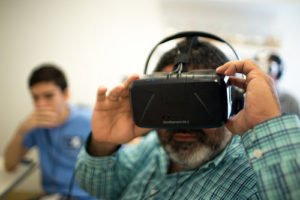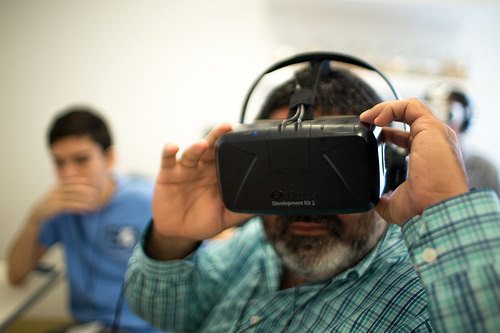Zeitungsdunkel
Some people out there may never heard of Clementine Ford. For those lucky people the advice is to stop now before you are irreversibly tainted.
Those who already know Ms Ford will be aware of the walking factory of human anger who self identifies as a feminist only because ‘I blame men for everything that has ever gone wrong in my life’ really chews into her twitter character limit. Clementine writes for Fairfax, has consistantly been a finalist in the Daily Telegraph Frightbat Awards and is probably best described as ‘controversial’.
Now, very surprisingly, it seems the Ms Ford may have managed to be a broken clock and tell the correct time just for a moment. Fresh off her recent successfully campaign to Facebook shame the mentally disabled, Clementine has found an online scandal about harassment in VR gaming, and never to be one to let social justice issues sit unnoticed for three weeks before jumping on board, rushed out some comments via the power of Fairfax and has made, again very surprisingly, some very valid observations.
Let us recap on the basic details. A blogger by the name of Jordan Belamire was playing a multiplayer VR game some time in the past month. During the game another player, described as male in nearly all accounts, decided it would be ‘funny’ to wave his virtual hands around the chest area of Jordan’s avatar. Jordon, not unsurprisingly, was not remotely impressed and, after the harassment continued, felt forced to quit the game.
At time of writing, Ms Belamire’s article is available to read online. It goes into greater details of the entire experience and also is of interest to scholars of the written word in the way Ms Belamire neatly homages Ford’s writing style despite being published earlier. Great minds, one assumes.
So Ms Ford and her editors have pressed submit and the circle of life now moves to where the adults of media proceed to analyse her wisdom, a process that normally involves well-justified mocking backed with a healthy serve of the real world. Here however it seems that Ms Ford, or perhaps more correctly Ms Belamire in her own original article, have some very valid points.
The game Ms Belamire was playing involved use of a HTC Vive, one of the small group of VR devices currently making tentative steps out into the world. These units are still relatively new, still priced above the wallet of the casually curious and, this author feels safe to say, are something that the vast majority of the public has yet to experience first hand.

Your author on this occasion is not one of that majority and has had a brief experience with a Vive at a trade convention. The simulation was relatively low res, the headset one suspected was not correctly focused and the presentation mildly mundane. Despite these restrictions your author was inside a house, carefully moving down the passageway and taking part in an experience that only stopped when the booth host pointed out one had nearly poked an observing gentleman in the groin while waving the right controller attempting to pick up VR coffee mugs from a VR kitchen sink.
Yup.
The groin.
Awkward.
What the headset does is completely remove all existing visual stimuli and replaces it. If the goggles are fitted correctly there is no light leaking in from the real world, only the black surround and the twin screens tricking your mind with stereoscopic. A developed game can then supplement that with fully surround audio, neatly replacing roughly 90% of the sensory input a person would be used to using for their day to day interactions with the world, with data that is completely artificial.
The experience is incredibly immersive, difficult to describe without sounding like a sales pitch and quite frankly, if Ms Belamire claims she felt very traumatised by the experience then you had better believe she bloodly well was.
So, that was the backstory. Onto the follow up and the backlash.
There have been articles over this occurance online, both in print and video. The game developers have apparently taken a pro-active stance with new patches, with the intent that their game should be a friendly, fun environment for all users. Various commentators pass various judgements. Ms Belamire in her original column makes some more open question style observations while our well known friend comes out with the massive gender card. A man has oppressed a woman and Something Must Now Be Done. Thank you Clementine. Broken clocks. That twice a day moment of telling the correct time doesn’t actually last very long.
Let us step away from the all men are evil tone and look back on who this ‘funny’ man with the ‘amusing’ hand gestures really was. Short answer? Just another online d—head hiding behind the protection of a username and several hundred real world kilometres of distance. That gamer, just like every other online bully, likes to think the rules of repercussion and responsibly no long apply when their victim or their victim’s friends are not in a position to physically request a polite apology. These people exist. They are shallow. They are tragic. They ruin online experiences for multitudes of people daily, and probably the only reason we have not seen this sort in VR games before is that VR games are still very new.
Clementine goes on to openly suggest that gaming is basically filled with drooling men who dominate the environment, shutting down any female attempts at involvement with constant sexism before staggering out into the real world to objectify the next person they can find harmlessly enjoying the sunshine. VR needs rules, she insists, lest VR multiplayer becomes yet another space in which women are not welcome.
Well there you go. Several conclusions can easily be made, the second being that Clementine is not a gamer. Obtaining a useful breakdown of gamer demographics can be a little tricky, as to be classed as a gamer all one has to do is regularly play games. As anyone with a Steam account or a console knows, what makes up a game is many and varied with a mildly important difference between a MMORPG, an online multiplayer shooter, a platformer, a First Person sandbox RPG and whatever exactly SingStar and Guitar Hero are formally classified as. A platform gamer may not play turn based strategy, but then again might. There are no real rules and no real ‘boy games’ and ‘girl games’. People play what they enjoy, regardless of age or sex. Overall the gender balance is quoted as being, if anything, slightly in the female’s favour in most sources, and anyone who doesn’t believe women play computer games has probably never spoken to a woman before anyway.
The problem here is not so much with the culture of gamers in particular but instead with the much broader culture of people who think they can do what they like while they hide behind online anonymity. Also, yes, the irony of complaining about this issue while writing under a pen name is completely lost on this author, thanks for asking.
Gaming is not a ‘wild wild west’. It is actually filled with people who want to relax with their chosen medium and they don’t as a rule tolerate d—heads. The game in question appears to be in open alpha, which does go a long way to explaining why the moron behaviour that so offended Ms Belamire was allowed to continue without being either booted for the game or banned outright. Gamers, in case you didn’t pick up the first time it was mentioned, are there to relax and enjoy themselves. Their toleration for people trying to spoil that experience is very finite and usually, using methods that depend on the medium, quickly dealt with.
Ford attempts to make the link between sexist men and gamers cowardly hiding behind an online avatar, and fails to comment on the much wider spread of avatar hidden abuse that leaks unregulated into the wider world. Ford herself within the last month, gleefully joined in with the online shaming of a mentally handicapped man from behind the safe avatars of her Facebook and Fairfax personas. Anyone with even a passing understanding of Twit would be no-doubt aware that medium is rarely one filled with sunshine and happiness. Some may argue that a gaming avatar is significantly different from a Twit account or even a professionally sponsored blog column, but an important commonality remains with all those examples – the user never has to look their victim in the eye while they abuse them.
This column is in no means intending to dismiss what happened to Jordan Belamire. She was harassed in an environment where she had every right to feel relaxed and comfortable, by a cowardly moron hiding behind an avatar. Her torment was, this author honestly believes, very real.
Yet the reaction by the usual suspects has been to blame men, blame gamers and demand more regulation. Is this really the problem here, or are we instead deeply ingrained within a society that not only tolerates, but in many cases rewards those who believe they can say or do what they want when online?
Being an adult is accepting responsibility for your own actions. Owning an avatars does not change that.
Photo by UTKnightCenter 










